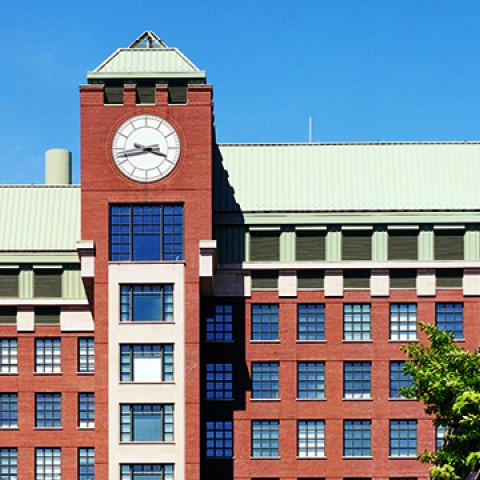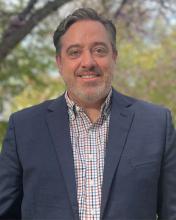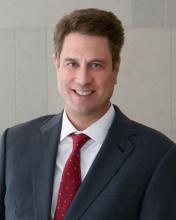Each spring, the John S. Diekhoff Awards recognize outstanding graduate mentoring and teaching. Nominations are made by graduate students, faculty members and student associations. This year, the School of Medicine’s Jason Mears and Andrew Pieper both received honors for graduate mentoring.
Jason Mears
Jason Mears recognizes his students come from diverse backgrounds and, as such, have unique needs. To best support them, he works to create a learning environment in which each student can thrive based on where they are in their scientific, academic and personal development.
This value-driven leadership creates a welcoming, supportive and inclusive culture in the classroom and lab, and has earned Mears university recognition. The associate professor in the Department of Pharmacology will receive the 2023 John S. Diekhoff Award for Graduate Mentoring during the School of Graduate Studies’ diploma ceremony Friday, May 19.
Mears strives to help each student establish foundations from which they can grow. He begins by ensuring everyone in the lab understands the
experiments’ principles and, instead of micromanaging his students’ work, he gives them the freedom to make mistakes and use the knowledge learned to shape their hypotheses and experiments.
“I have total confidence that Jason’s goal is to make me a better scientist, and I deeply respect his opinions and feedback,” explained one of his nominators.
The success of his mentoring style is evident. As another one of his nominators explained, “He’s built a research group which can tackle everything from mouse studies to steered molecular dynamic simulations.”
“Research is a collaborative endeavor, and I enjoy working with students seeking new discoveries,” said Mears. “I love the excitement of exploring new projects and the pride that comes when students accomplish their goals. Being a mentor allows me to share these wonderful moments with developing scientists.”
As a mentor, Mears is also an advocate for his students, helping them navigate challenges when they arise. And his approach pays off—one student nominator described him as a “harbor in the storm” during an inflection point in their academic career.
Having struggled on a qualifying exam, the student was on the verge of dropping out of the pharmacology program. By addressing the students’ concerns about the exam as a one-size-fits-all measurement focused on fact memorization instead of applied knowledge, Mears helped the student create a plan for success.
“Because of his advocacy, I didn’t quit the program, and the qualifying process was radically improved for future students,” the student shared.
Andrew Pieper
Andrew Pieper strives to influence his students far beyond their days at Case Western Reserve University School of Medicine. As the Rebecca E. Barchas, MD, Professor in Translational Psychiatry, Pieper views mentorship as a key component of the academic experience.
“I still carry my previous mentors around in my head and look to them for guidance; I hope to provide this same lasting benefit to others,” he said. “It is a joy and privilege to help young scientists achieve the training they are seeking to launch their careers.”
Pieper’s person-centered approach toward mentoring, positive outlook and generosity of his time have not gone unnoticed. He’ll be recognized with the John S. Diekhoff Award for Graduate Mentoring this year, an honor he will receive during the School of Graduate Studies’ diploma ceremony Friday, May 19.
“Dr. Pieper is an extremely compassionate mentor who takes great care to consider students’ general well-being in the context of their progress,” said one student nominator.
Another student said, “He has been instrumental in my scientific, professional and personal development. He helped me network with collaborators and experts in my field, passed along opportunities to give lectures, presentations and write reviews, tirelessly edited my grants and is always available when I need him.”
Pieper is humbled by the honor.
“I feel truly honored and fortunate to have been nominated and selected for this prestigious recognition,” he said.
Pieper expects his graduate student advisees to adhere to the values of honesty, integrity, disciplined innovation, optimism and generosity—and he leads by example. When he was invited to present his lab’s work at the International Research Conference on Neurodegenerative Diseases, he brought his students along and gave them the opportunity to present their work themselves to help them gain experience, make connections in the scientific community and receive the recognition they deserved for their hard and innovative work.
Beyond these efforts, Pieper is committed to building and reinforcing diversity, equity and inclusion in science—seizing opportunities for advocacy throughout his career including delivering a lecture to the U.S. Congress. He also launched a summer research experience to promote diversification of the scientific and medical community pipeline to underrepresented racial and ethnic groups, and has since expanded the program for those who identify as LGBTQ+.
When Pieper accepts the Diekhoff Award May 19, he plans to mark the occasion by taking his lab out for a celebratory dinner.
About the award
The Diekhoff Award honors John S. Diekhoff, a distinguished scholar, teacher, mentor and administrator who served Case Western Reserve in several capacities during his tenure from 1956 to 1970: professor of English, chair of the Department of English, dean of Cleveland College, acting dean of the School of Graduate Studies and vice provost of the university.
The Diekhoff Award, established in 1978, recognizes outstanding contributions to the education of graduate students through advising and classroom teaching. The annual award is presented to two faculty members who epitomize what it means to teach graduate students: to connect them with experts in their discipline, engage them academically in a forthright and collegial manner, and actively promote their professional development. In 2009, the Diekhoff Award was expanded to recognize two additional full-time faculty members who excel in the mentoring of graduate students. A committee of graduate and professional program students with the guidance of the Graduate Student Senate reviews the nominations and recommends winners.




